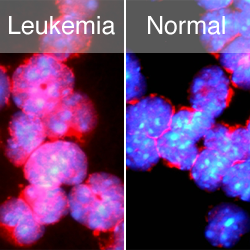- Aging (9)
- ALS (12)
- Alzheimer's Disease (8)
- Bioengineering (31)
- Blood Diseases (52)
- Cancer (55)
- Cardiovascular Disease (25)
- Diabetes (30)
- Endocrine Disease (1)
- Eye Diseases (10)
- Fibrosis (6)
- Gastrointestinal Disease (8)
- Genetics/Epigenetics (24)
- Graft-Versus-Host Disease (1)
- Hearing Loss (5)
- Immunology (15)
- Kidney Disease (12)
- Liver Disease (6)
- Lung Disease (9)
- Multiple Sclerosis (1)
- Musculoskeletal Disease (11)
- Nervous System Diseases (40)
- Parkinson's Disease (7)
- Psychiatric Disorders (11)
- Rett syndrome (1)
- Skin Diseases (6)
- Stem Cell Biology (28)
- Stem Cell Tourism (3)
Copyright © 2024 The President and Fellows of Harvard College | Accessibility | Digital Accessibility | Report Copyright Infringement


 Acute myelogenous leukemia (AML) is one of the most common types of leukemia—a cancer of the bone marrow and blood—in adults, affecting about 13,300 women and men in the United States annually. The disease is also diagnosed in hundreds of children in this country each year.
Acute myelogenous leukemia (AML) is one of the most common types of leukemia—a cancer of the bone marrow and blood—in adults, affecting about 13,300 women and men in the United States annually. The disease is also diagnosed in hundreds of children in this country each year.